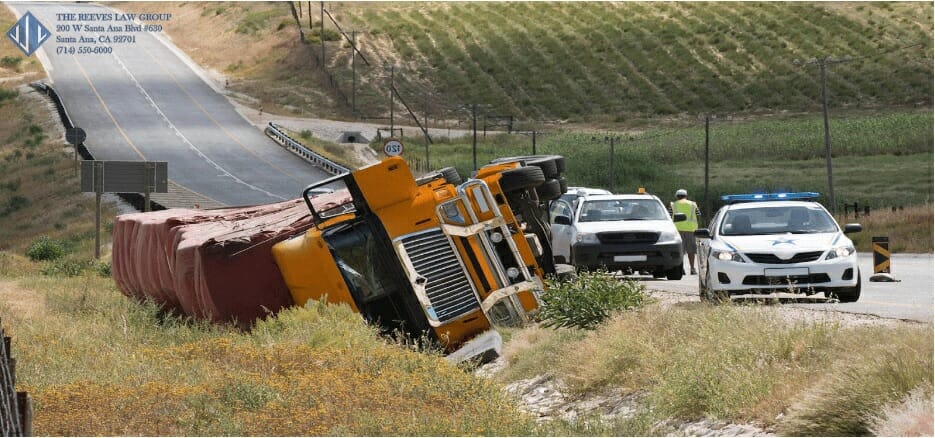
Long hours on the road, tight deadlines, and possible substances that influence truck drivers while behind the wheel can often lead to engaging in risky maneuvers. Not to mention a myriad of potential mechanical failures or environmental hazards.
Multiple factors usually contribute to accidents, but despite this we’ve pulled together a list of the most common causes of truck accidents in California and the US.
The Types Of Trucks That Cause The Most Accidents
While most people think of trucking accidents, they envision 18-wheeler vehicles. These trucks cause significantly more harm than their fair share.
Tractor trailers can weigh up to 80,000 pounds. Other truck types can also cause catastrophic accidents, including:
- Cement trucks
- Dump trucks
- Garbage trucks
- Flatbed trucks
- Tow trucks
- Tankers
- Delivery trucks
- See full list of truck types operating on Californian and US roads and highways
Many truck accidents are caused by truck drivers who violate one or more of the numerous state and federal regulations that govern trucking vehicles and companies.
Truck Accidents Causes Related To Truck Drivers
Truck accidents are almost always caused by a driver, either the truck driver or other drivers. The following are some of the most common causes of truck accidents that can have deadly consequences:
Fatigue
This is a common driver error, drivers of automobiles are not immune either . Often times, truck drivers are required to work long hours.
Despite the fact that the law mandates that drivers take a set amount of rest, some drivers disregard this and cook the books digitally or run dual log books. It is easy to imagine a truck crashing when the truck driver is dozing off behind the wheel.
Driving While Intoxicated
Truck drivers carry commercial driver’s licenses, and the requirements for intoxication are significantly more stringent than for other motorists.
A commercial driver’s license holder commits an offense while driving with a Blood Alcohol Concentration (BAC) of 0.04% or more, which is half the amount that would result in an OWI arrest for the average driver. You can typically use such an offense to win a claim for personal injury against the driver.
Reckless Driving
Reckless driving is another type of driver error. It encompasses a variety of negligent actions, such as breaking the law by speeding, disobeying traffic signals, reckless passing on a two-lane road, and tailgating, among others.
Speeding or Driving Too Quickly For The Conditions
Many semi-trucks cannot exceed the prima facie speed limit because their engines are equipped with governors, or speed-limiting devices, that prevent them from exceeding the speed limit. Or they are simply too heavy to accelerate uphill.
Despite this, not all trucks have these devices, and even those that do can drive too fast for the given weather, road, or traffic conditions.
The operation of a big rig requires a high level of skill and knowledge. They’re massive, heavy, and unable to halt quickly.
They can’t turn quickly enough without rolling over or jackknifing. As a result, even a large rig traveling at the speed limit may travel too fast to respond to changing road conditions, resulting in a crash.
Distracted Driving
Truck drivers are just as susceptible to the temptations of distracted driving practices like texting and cell phone use as anyone else.
Although they utilize CB radios less frequently than they did in the past, the majority of truckers still communicate heavily using cell phones with headsets and on speakerphone.
Even listening to music to alleviate the boredom of a long drive might be considered distracted driving depending on the situation
Poor Truck Maintenance
Poor vehicle maintenance is the cause of numerous truck accidents. Tires that are worn beyond legal limits, for instance, can result in fatal blowouts.
Whether or not this is the driver’s fault depends on who was responsible for truck maintenance. Not always the truck driver, but it can be.
Poor Cargo Loading
Poor cargo loading can cause cargo to spill onto the road at high speeds or possibly cause the entire vehicle to roll over or otherwise become unstable.
Sometimes low wage employees are responsible for the cargo loading, but other times the trucking company or even a skilled third party is.
Regardless, the truck driver is the “captain of the ship” and should at least inspect the goods before departing the loading dock.
Yielding Failure
Truckers may fail to yield due to distractions, inattention, or the mistaken belief that they can do whatever they want on the road due to their size.
Whatever the reason for truckers failing to yield, the result is frequently a dangerous sideswipe or angular collision, or the smaller vehicle swerving and either running off the road or causing its accident.
Turning Carelessly At Intersections
When a tractor-trailer turns at an intersection, the cab turns first, forming an angle with the trailer. A typical big rig comprises a tractor cab connected to a trailer via a pivoting hitch.
The trailer follows the cab through the turn, gradually swinging back in line with the vehicle pulling it. This maneuver necessitates the trucker’s caution and skill.
If the cab makes a too-tight turn, it will pull the trailer across a neighboring traffic lane or (in the case of a right-hand turn) across a street corner, endangering motorists, cyclists, and pedestrians.
Due to their size, the risk is especially high when they make tight right turns.
Many semi trailers have warnings for automobile drivers that illustrate this phenomenon, but if the automobile driver is stationary and is surrounded by traffic, it is not their fault if they are hit by a moving truck.
Vehicles Passing On A Two-Lane Road
Trucks are slow, and two trucks passing each other can seem like an eternity. Sometimes truck drivers have good reason for passing another truck, regardless of what other motorists may think.
A truck though may of course make an unsafe pass, or pass illegally such as over a double solid yellow lane marking.
Truck Accidents Causes Not Related To The Driver
Not all truck accidents are the truck driver’s fault (or any other driver, for that matter). Some common causes of truck accidents are due to “acts of god” or other dynamic conditions.
Driving is not a perfectly safe activity, however negligence from other parties and other factors can and do routinely play a part! Below are some common ones we run into in California.
Road Conditions
A truck accident can be readily caused by poor road maintenance. Specifically, road construction, unclear traffic signals, or unexpected detours can cause accidents.
For example, a government could be held accountable for neglecting to post a sign warning of a traffic hazard.
Poor Weather Conditions
Rainfall can cause roadways to become slick, and varied weather conditions might impair visibility. In some instances, a weather-related catastrophe such as a hurricane can be attributed to “an act of God,” but in others, a defendant can be identified (e.g., bald tires that are not suitable for rain which were missed during the safety inspection by the trucking company).
In icy conditions for example, an inexcusable delay in salting the roads might make it nearly impossible for a large and heavy truck, for instance, to stop promptly and may make the local road authority liable.
Unrealistic Time Constraints
In order to maximize their own earnings, some trucking companies place a considerable amount of pressure on drivers to transport their cargo swiftly.
A driver who responds to this pressure by driving too quickly is partially accountable for any mishap that occurs.
However, the trucking business may also carry substantial liability if their dispatch requests clearly went beyond what is reasonable and what they typically do for other drivers.
Poor Driver Training
According to the Federal Motor Carrier’s Safety Administration, inexperience is the third most common contributing factor in commercial heavy duty truck accidents.
Truck driving schools typically let students graduate in as little as 15 days prior to allowing them to sit for their CDL test.
They can be held liable if there is a clear pattern of inadequate teaching or other factors. Of course the driver’s employer can also be held liable if the driver doesn’t meet legal requirements.
And finally the driver can be held liable, since they’re the captain of the ship making the calls and doing the actual driving.
Frequently Asked Questions
Here are some common questions trucking drivers or sometimes other parties ask about:
What is a DOT-recordable accident?
A DOT-recordable accident is one involving a commercial motor vehicle that results in death, personal injury to any person requiring immediate medical attention away from the scene of the accident, or vehicle damage requiring towing.
Why are large trucks dangerous?
Typically, tractor trailers transport enormous quantities of freight, which increases their weight momentum, and thus cause a greater impact.
In the event of an accident, dangerous cargo carried by some large trucks, such as flammable materials or toxic chemicals, can threaten human life.
What is a truck-only lane?
Truck-only lanes are precisely what their name suggests: highway lanes that only permit the usage of large trucks.
California is one of the few states with exclusive truck lanes. In California, these lanes are segregated from the rest of the highway and marked truck-only.
Who Is Held Liable For a Truck Accident?
Who is responsible for a truck accident? Parties other than the truck driver may be held accountable for truck accidents. Depending on the conditions, additional potential parties could include (but are not limited to):
- The other driver
- A government agency
- The trucking company that employed the driver or loaded the cargo
- A pub that served alcohol to a driver who caused a DUI accident
Depending on the circumstances, truck accident liability may be shared by multiple parties, legally referred to as “joint liability.”
What to Do Immediately After a Truck Accident in California
If you’re wondering what to do after a truck accident in California, the most critical first step is to seek medical attention, even if you feel fine initially. Truck accident injuries often cause delayed symptoms, and conditions like internal bleeding or traumatic brain injuries may not become apparent for hours or days. Under California law, your medical records serve as essential evidence linking your injuries to the collision, which directly impacts your ability to recover damages.
While still at the scene, try to preserve evidence by taking photos of vehicle damage, road conditions, and any visible injuries. Exchange information with the truck driver and ask for their employer’s name and insurance details. If witnesses stop, collect their contact information as well.
Before speaking with the trucking company’s insurance adjuster, consider consulting a California truck accident attorney. These cases involve complex federal regulations and often multiple liable parties, which requires professional investigation to establish negligence and protect your right to fair compensation.
10 reference sources or statistics:
- https://www.iihs.org/topics/fatality-statistics/detail/large-trucks
- https://www.nh.gov/dot/org/projectdevelopment/bridgedesign/documents/truckweights.pdf
- https://www.fmcsa.dot.gov/safety/data-and-statistics/2016-commercial-motor-vehicle-traffic-safety-facts-sheet
- https://injuryfacts.nsc.org/motor-vehicle/road-users/large-trucks/
- https://www.fmcsa.dot.gov/safety/data-and-statistics/large-truck-and-bus-crash-facts
- https://policyadvice.net/insurance/insights/truck-accident-statistics/
- https://www.fmcsa.dot.gov/safety/research-and-analysis/large-truck-crash-causation-study-analysis-brief
- https://www.trucking.org/economics-and-industry-data
- https://www.statista.com/statistics/1171533/truckload-market-size-us/
- https://www.bts.gov/











Thanks for the post. It will help many people who are aware about the truck accident. They will know the reason of a truck accident from this post.